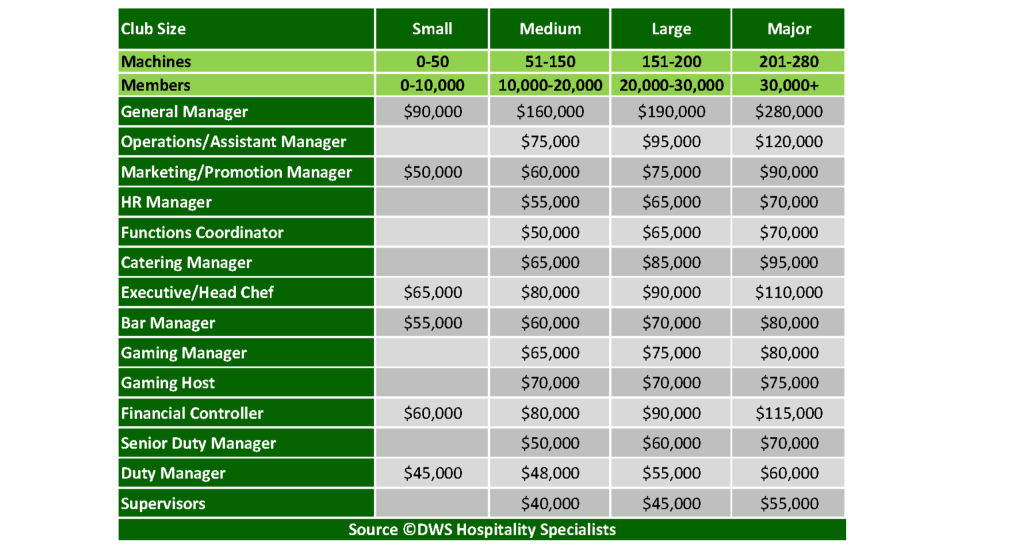We are also observing significant activity in club redevelopment and expansion programs, particularly from those clubs that have left some development plans on ice while waiting for the change in government power.
Over last 12 months there have been signs of meaningful growth in our successful clubs, but in what is still a highly competitive industry it will only be the more progressive clubs that will largely benefit from increased community confidence and a more sensible approach to relevant legislation, however most clubs should look forward to some growth in the coming years.
No doubt an improvement in the economy will ultimately feed into the employment arena, putting pressure on remunerations.
As there were only minor increases across salaries in 2013, the focus is predominantly on progressive clubs who are increasing the intellectual property of their staff, particularly in management areas such as marketing where clubs are switching to digital database marketing that requires a more demanding skill matrix. New Marketing Managers tend to be younger, tech savvy and are demanding increased salaries compared to more traditional marketing/promotion managers.
A new role which gained increased attention in 2013, and shows no sign of slowing down, are Gaming or Loyalty Hosts who manage the club’s gaming loyalty operation from the floor as opposed to the conventional Gaming Manager role which has tended to be more administrative focused. The Gaming Host role also requires a different set of skills which include customer service, public relations, marketing and loyalty program management. These roles are also attracting significant remuneration levels.
In my 2011 review, I commented that the shortage of Chefs in previous years was easing as club management realised that Chef salaries needed to be increased in order to attract a higher calibre of skill required to drive profitable food operations. This trend has continued with clubs competing on the remuneration level with restaurants and hotels to attract quality Chefs. We have observed a significant increase in remuneration for high performance Chefs who can generate healthy profit from the club’s food operation without subsidies.
An ongoing issue, however, is the reduced pool of Chef candidates which continues to affect Queensland clubs, with some venues now seeking alternative sources of recruitment.
DWS has conducted 31 senior club recruitments this year, securing appointments for CEOs, Executive Chefs and Senior Duty Managers. There is no doubt that the club industry is seen as a serious career opportunity for hospitality managers, which is reflected in the high standard of applicants seeking positions. Tertiary qualifications are becoming an expectation for many club positions such as General Managers, Finance Managers, Human Resource Management and Marketing Managers. This is largely due to the increased management responsibilities, skills and professionalism required in our industry.
DWS Recommended Club Salary Averages from November 2012 – 2013
The salary averages graph below is generated from data incorporating management recruitment positions, numerous club salary reviews and management restructure over the last 12 months as well as our own empirical evidence. It indicates the various salary averages paid in clubs of varying sizes. Whilst these averages should not be taken in isolation from a club’s own situation, it does provide a general guide. Facts relevant to individual clubs that should be considered are profitable performance, qualification and experience of a particular candidate and the needs of the club.

* This survey endeavoured to gross the total remuneration value of remuneration packages as accurately as possible. Since the total salary average hasn’t altered significantly over the past few years, this matrix reflects salary averages based on club size.
Inflation
Inflation over a given period is a key measurement element when reviewing remuneration. Whilst inflation adjustments maintain a relative dollar value, it does not recognise increased responsibilities, or more importantly in today’s climate, market value. The CPI increase in the Brisbane region for the financial year ending June 2013 was 2.0%.
Impact of Increasing Legislation on Senior Management
The liquor and gaming industry continues to grow in Queensland, significant changes have been endured through various levels of government including Federal, State and Local Government. These regulatory requirements have continued to increase in the areas of corporate governance, food hygiene, the Privacy Act, industrial relations and workplace health and safety. The last 12 month period has seen significant increases in AUSTRAC and OH&S regulations on venues.
Both State and Federal governments appear to be continually reviewing and proposing regulatory changes. There has been further implementation of the new Fair Work Act, national standards for WH&S as opposed to the current State-based legislation requiring a total review of OH&S processes and procedures. This in itself has created extra burdens for General Managers and operational management.
The administration of the vast majority of the current and future regulations is the responsibility of the Club’s senior manager, particularly the General Manager. Any senior management staff remuneration should recognise continuing increase in regulatory responsibility.
Summary
Committees and Boards have a fiduciary responsibility to the members to ensure that they are attracting the best quality staff and are paying the appropriate salaries to attract and retain competent personnel. Given the complexity of the senior manager role in today’s club environment, Board and Committees should consider independent expert advice when conducting reference checks or setting salary levels.
It pays to remember that good staff will choose to work for good employers and stay where they feel appreciated. Remuneration will always play a part in this decision.


